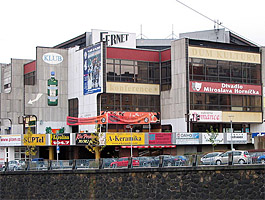
The Association Against the Giant House in Plzeň handed over signatures for the referendum
 |
| demolished cultural house |
Czech development company Amádeus wants to build Corso Americká for 2.5 billion CZK with shops, offices, apartments, and leisure spaces; it has not yet applied for a territorial decision.
"This is the largest signature campaign in the city's history, and councilors will no longer be able to ignore their citizens. More voters want a referendum than those who voted for the individual parties of the large coalition ODS and ČSSD at the Plzeň city hall. It will be the first referendum in a large Czech city," said Marek. People will approve whether the city hall should take all necessary steps to prevent the creation of a commercial facility and whether it should promptly approve the change of the land-use plan for the area to urban greenery.
According to representative of the association Plzeňané Barbora Ottová, most of the surveyed people expressed opposition to the planned construction and do not want a large shopping center near the museum and the square. If the referendum is successful, they will be able to decide on the future shape of the city center by the Radbuza River themselves. "The entire area should be interconnected, not made up of fragments of arrogant and selfish architecture like in the case of the Corso proposal or the possible expansion of the neighboring Tesco," said architect and member of the referendum committee Filip Kastl. His colleague Petr Vaněk stated that people often fell into great apathy regarding whether the referendum could change anything. "Collecting signatures took hundreds of hours, and we talked to thousands of citizens. People were excited that we are not organized by anyone and do everything in our free time," said Ottová.
After today's submission of nearly four kilograms of signature sheets, the municipality can return the proposal due to a lack of signatures within 15 days. Otherwise, the first city council must set a date for the referendum within 90 days on September 6. If it does not announce it, the regional court will decide within 15 days. The plebiscite will be valid if at least 35 percent of voters participate. It will be successful if over 50 percent of them decide in favor of the proposal. It would then be legally binding for the council. Any change of the area for greenery to something else could then be decided only by referendum again. According to Marek, the city can fight against the construction by not selling the remaining plots that Corso needs, preparing a regulatory plan, changing the land-use plan, or declaring a building moratorium.
The controversial construction has been discussed in Plzeň since November 2009 when the investor announced the project in the EIA documentation. A petition against the construction was then created, which 9,200 Plzeň residents confirmed by June 2011. The city hall announced an architectural competition for the site but eventually canceled it. It did not initiate the change of the land-use plan requested by activists. According to the city, the reason was that the investor was already far along in preparing the Corso.
The English translation is powered by AI tool. Switch to Czech to view the original text source.
Related articles
0
22.12.2015 | Amádeus wants to build a shopping center in Plzeň again, it is supposed to be smaller
0
13.01.2015 | Developer Amádeus sued Plzeň for damages of 1.8 billion
0
06.01.2015 | Plzeň will negotiate the settlement with the investor of the shopping center
0
23.01.2014 | Due to the city's approach, Amádeus terminated the giant house project in Plzeň
0
31.05.2012 | Plzeň will lease land for the Corso building on Americká třída
0
20.04.2012 | People from parts of Brno that wanted to break away want less construction
0
07.12.2011 | Massive multifunctional building in the center of Plzeň receives positive EIA assessment
1
05.09.2011 | The association against the demolition of the "kulturák" in Plzeň is preparing further steps
5
23.08.2011 | New house in the center of Pilsen will not just be a store; it will have more functions
0
09.08.2011 | Plzeň wants to have a say in the shape of the new building instead of the "culture house"
1
21.06.2011 | 150 people demonstrated in Plzeň against the demolition of the cultural house
1
16.06.2011 | Plzeň rejected the regulatory plan for the area of the cultural house by the Radbuza
0
24.06.2010 | Plzeň will announce a competition for the design of the area with the House of Culture









